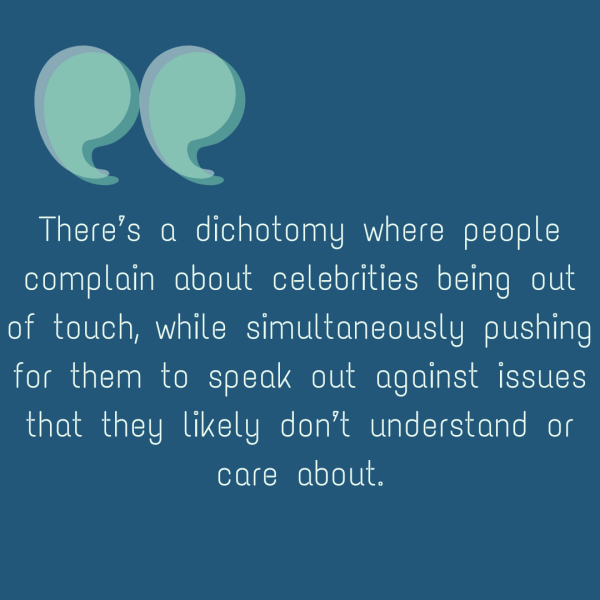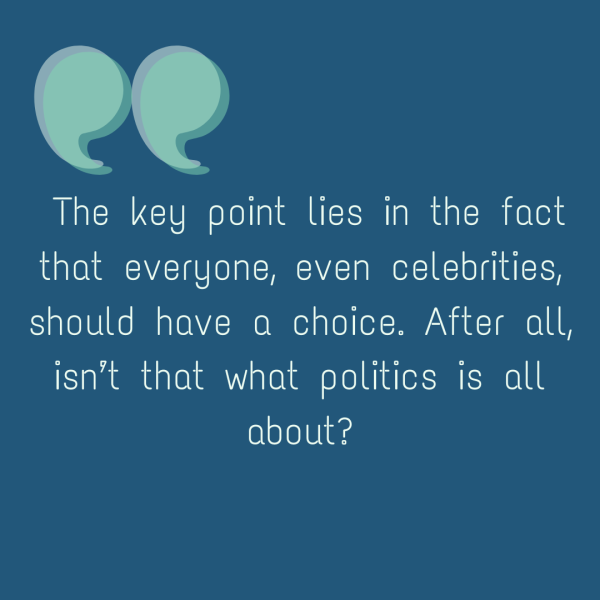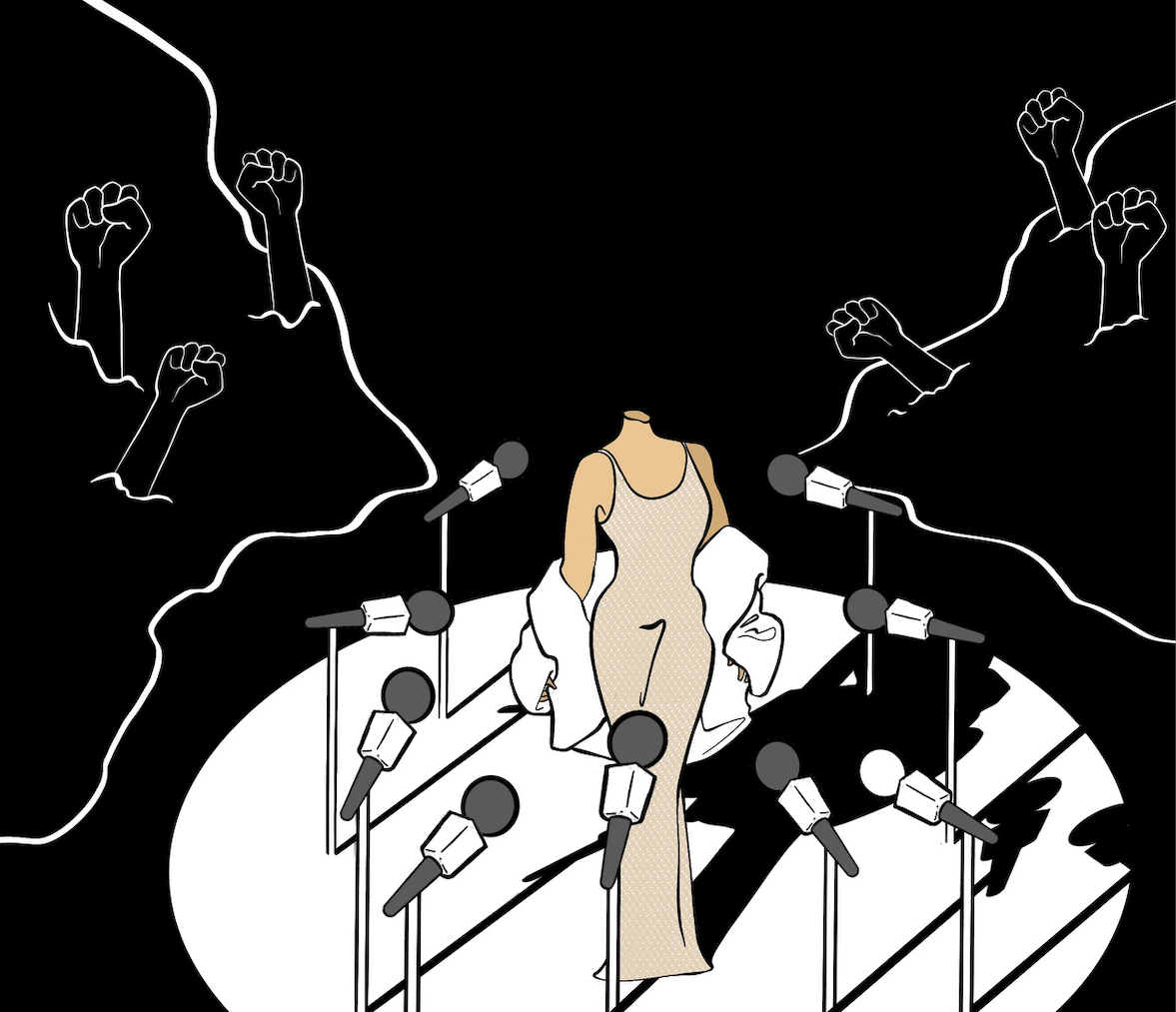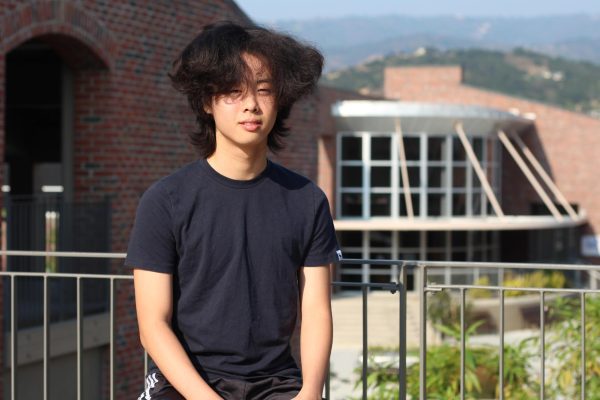“If you’re not speaking out, you’re part of the problem.”
It seems like nowadays, everyone is expected to have a political opinion. Instagram feeds are flooded with posts egging on others to speak up, and amidst all this hubbub, celebrities are subject to public scrutiny. It seems the public sees it as an obligation for them to share their political opinion, especially since many celebrities have platforms large enough to have an impact on public awareness and sentiment. However, in a more politically inclined area like the MVHS community, this expectation that celebrities must share their opinions on controversial issues can bring forth a plethora of misinformation.
Celebrities aren’t all-knowing. You’re asking people who are often viewed as having a skewed worldview – whether it be due to their lavish lifestyle, or just their privilege – to comment on issues that not only probably don’t affect them, but are extremely nuanced and specific. There’s a dichotomy where people complain about celebrities being out of touch, while simultaneously pushing for them to speak out against issues that they likely don’t understand or care about.

Furthermore, celebrities usually aren’t experts when it comes to politics, and more importantly, they may not understand politics outside of their niche. To put it into perspective, it’s useful to gain insights into a celebrity’s thought process when it applies to their specific field, such as a well-known biologist’s opinion toward climate change or wildlife conservation. However, if you were to ask the same biologist a question about a foreign country’s ongoing civil war, you can’t possibly expect to receive an apt, well-researched response.
This pressure on public figures to speak out will likely rush them to take a stance before they’re well- read on a topic, or have formed a definitive opinion. In fact, they might not research at all, opting to take the “politically correct” opinion to appeal to the public – but these acts of performative activism aren’t necessarily appealing to individuals at all. On the contrary, performative activism can garner intense backlash.
For example, Kylie Jenner posted a pro-Israel post mere days after the Israel-Hamas conflict began. An hour later, amidst growing public backlash, the post was taken down and replaced with a post touting Palestinian support. This fickle and pandering to the public perfectly encapsulates the problem of performative activism: celebrities might, in fact, not care about the issue at all.
There are definitely arguments to be made that the ends justify the means; after all, as long as their platform reaches a wide range of people, it doesn’t matter whether the issue actually mattered to the celebrity, but we’d argue that it does – not only might celebrities be spreading false information to an impressionable audience, but this might be the very reason that many people don’t have a deeper understanding of these issues.
At its core, democracy requires that citizens be able to form their own political opinions. Having celebrities spitting out half-baked research and arguments to their massive audiences doesn’t encourage people to do their own research and develop more than just a surface-level understanding and opinion. Recall Donald Trump calling Covid-19 the “China virus” and staunchly opposing the vaccine – and the number of people that believed it. Granted, Trump is technically a politician, but his tendency serve as a perfect reminder of the drastic influences public figures, which include celebrities and politicians, can have on their audiences. Semantics aside, whether people believe it or not, celebrity public opinions will always influence personal opinion. That’s why they’re often called influencers.
There also seems to be the argument that by becoming a public figure, celebrities essentially sign up to have some sort of public opinion. But someone who’s a singer or athlete didn’t necessarily sign up to share their political ideologies. They became public figures to share their songs, or play the sport they love.
That’s not to say that celebrities should refrain from sharing political opinions at all, or that there aren’t situations in which it would be beneficial, or even considered “correct” (though that is subjective) to share their opinions. Celebrities’ opinions and activism do have the capability to make their impact on politics, if properly handled.
For example, Oprah Winfrey, a former victim of child abuse, heavily promoted the National Child Protection Act – also known as the Oprah Bill – in 1991, and played a large role in its eventual passage. After Taylor Swift encouraged her fans to register to vote in September of this year, the website she directed fans to saw a record number of new registrations, jumping more than 23%. These showcase positive forms of activism celebrities can opt for if they choose to, and this should definitely continue. But these cases share a common thread – these celebrities were all driven by passion and personal conviction, and it was all voluntary.

Instead of having this general expectation of celebrities sharing their personal opinions, we could be encouraging celebrities to advise their fans to research these issues further, directing them to credible resources, experts and organizations that specialize in these topics. By doing so, celebrities can contribute positively to the political sphere without feeling pressured to endorse a specific viewpoint. Obviously, if they want to share, they’re more than welcome to; democracy’s essence is that it provides freedom for individuals to have their own voice in political or social issues. But nonetheless, the key point lies in the fact that everyone, even celebrities, should have a choice. After all, isn’t that what politics is all about?












